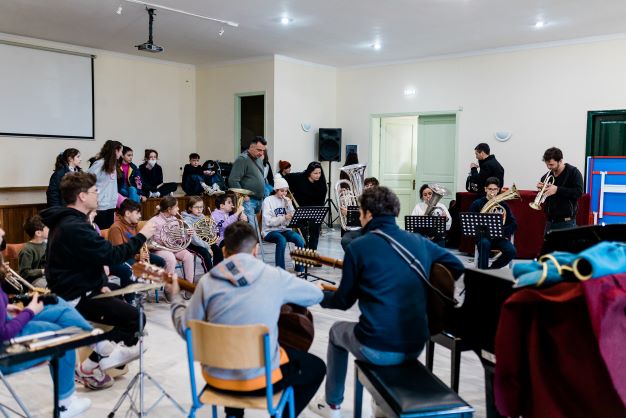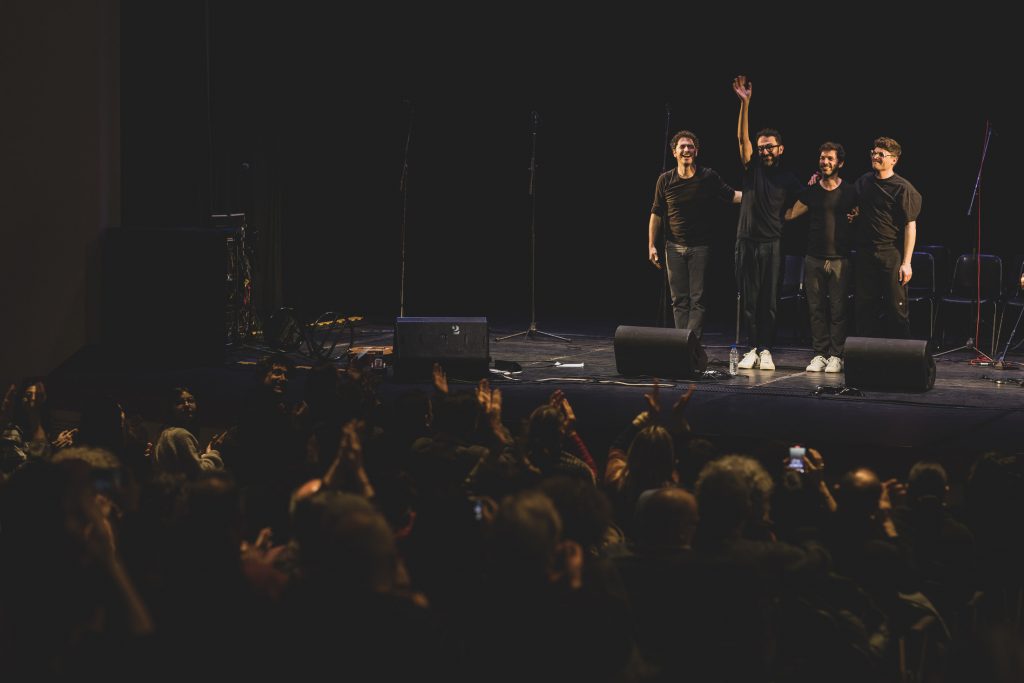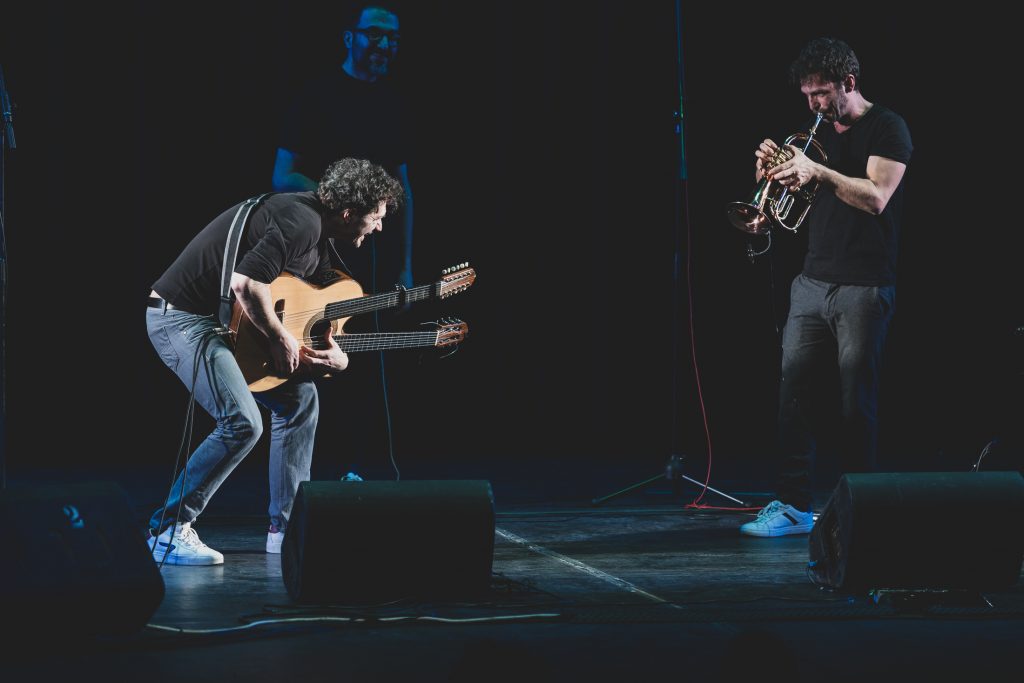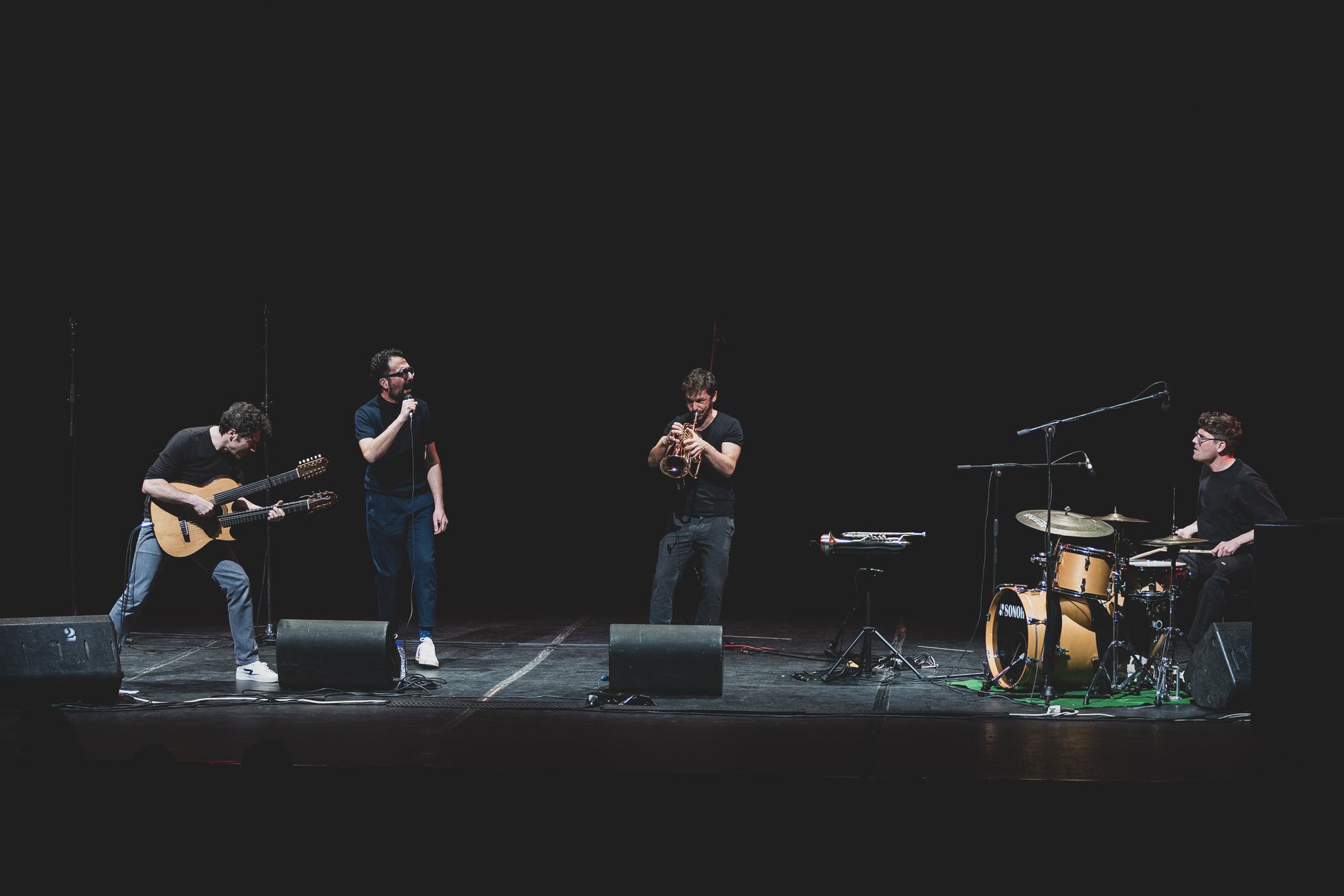I descend to the dressing rooms of the Homerion Spiritual Centre in the central square of Chios. The member of the group Masaa are waiting for me for a snap interview.
An innovative multicultural quartet, with Rabih Lahoud from Lebanon as lead singer, who writes lyrics in Arabic, and three Germans who, while they say they play jazz, do something magical beyond jazz, ethnic or any genre. Reentko Dirks with a homemade two-neck guitar made in Turkey, Demian Kappenstein working his magic on his drums and Marcus Rust with his “tweaked” trumpets with four – instead of three – pistons.
The band has successfully toured Europe, Asia and Africa and has received numerous awards, including the German Jazz Award (2021) for the best vocal album of the year and the Förder-RUTH of the Rudolstadt Festival (2015).
In the morning of the same day, the band met the students of Musical School of Chios and practiced together. A surprise for the concert on the making!

The interview can wait a bit! Let’s go “fast forward”. I can’t describe the concert enough! They won the audience over with every note! To have the audience clapping more and more during each song has never happened to me before! Their climaxes, the pauses, the “battles” between the guitar and the drums, the blending of the trumpet with the voice were something magical. The kindness of Rabih, obviously moved, explained the lyrics, while it was obvious that they “couldn’t believe” what was happening in the square.
The “double neck” guitar with its wide range of sound, sounding both like a bass and like a sharp violin or even as a percussion instrument, the trumpet producing its own sounds and the drums, as multiple instruments, imitating the birds, the noises, the sonic indeterminacy. With them, like a wind, Rahib’s voice bobbed up and down sensually in the score. Everything is so “western”, so “oriental”, so “borderless”. And that’s what makes them special!
And for the finale, the most moving moment. Dozens of children from the Music School of Chios, came on stage and accompanied the band in a song. Α wonderful scenery, only music can provide! It was no coincidence that the audience called the band two times back on stage for two encores.

And now. ..”flash back”. An hour earlier we had this snap interview. Enjoy!
First of all. Reentko, what’s this guitar?
It is a Turkish guitar. It is called “double neck guitar”. One neck has 6 strings, the other one has 9 strings. It has a different sound.
Reentko plays the guitar and it sounds so “eastern”.
So it is the western neck and the eastern neck!
Yes, that’s accurate. It is custom-made in Istanbul.
You all live in Germany, right?
Yes, but in different cities. Two of us live in Dresden, Marcus in Berlin and Rabih Monheim near Cologne.
How do you manage to meet?
We play a lot of concerts. During the concerts, we work a lot together. If you ask how we met, the three of us (the instruments’ players) studied at the same music school and Marcus introduced Rabih to us.
You are about 10 years together?
I think a bit more, twelve perhaps.
Rabih, as you are the “eastern influence” in the band, do you use ousak “music roads”?
Oh, I know what you mean. We call it Makam. We don’t use it exclusively but yes, in some songs we do! I discussed it a lot with Reentko and we use some of these scales. Sometimes, It comes as a color in my voice.
How many albums do you have? I read that you even won a prize.
Actually five albums. One of them is with an orchestra and we are happy that we won the German Jazz Award for the best vocal album of the year in 2021.
I noticed that you play a lot of concerts. Do you manage to live as musicians?
Some of us are doing things involving music, like teaching, but we have the privilege to live from this job. It is important because you can focus on music. In Germany it is easier to do it. We know that it is a struggle.
I read that you write theatrical music too… Tell me about it.
(Demian) Oh yes! Reentko and me. Sometimes it is different, sometimes not. Improvisation parts are very short. You have to see what fits the theatrical piece, sound-wise, groove-wise. Of course, there are a lot of similarities in writing songs for a band or for an act.
(Reentko) The process is the other way around. There are things that come to me from improvisation and I try to fix them in a piece, precisely and timely exactly. In the band, we open it, we have the main idea and we use it to “create” the song.
You have to match the music with the theatrical play.
(Reentko) Yes, but it is inspirational. Music has to function, it has to interact with something else. I compose in a different way but it is good for me to do it because I don’t put all my effort into one thing. I remain creative and active.
 So, guys, you play jazz?
So, guys, you play jazz?
Jazz has so many facades but yes in a way.
What about your lyrics? Rabih, you use Lebanese language. Is it easy to connect the music with the lyrics as you have different origins and you don’t understand what Rabih says (laughs)?
(Demian) He seems right when he explains the lyrics to us because he fits the mood. It is very cool and as I get it he improvises with the lyrics. We can’t understand the way the lyrics take when he improvises. The language barriers are there. We play in countries that they don’t understand english or german or lebanese. It is always about not understanding but still open your heart to the song, to the message.
As I say, Music is an international language. You have to feel the music.
(Rabih) That’s right! We were lucky today that we worked with greek and refugees children. We were able to communicate, we didn’t have to use words, and we were connected.
(Marcus) It was like we knew each other for years.
***
Closing the interview, as an inside joke, I asked the band members to tell me their “guilty pleasure” in music. Surprise! It is the dance music scene of the 90s!
I wished them good luck and I really enjoyed them 1 hour later on the scene of Homerion Cultural Center of Chios.
Read also in AthiNEA:
Interview With Nikolaus Resa of Berlin Piano Trio
Irene Skylakaki and Danton Supple Talk about their New Album “Hydra”
Ten Questions Looking For an Author | David Mitchell








